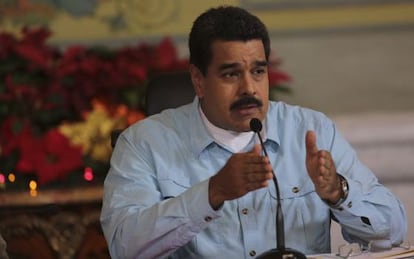Venezuelan parliament appoints justices in line with regime’s agenda
The government puts 16 new judges in place to fill all vacant public offices

The Venezuelan government has appointed 16 new justices to the Supreme Court, staffing its last vacant offices and thus completing a week-long overhaul. The changes were one of the opposition’s main demands during the frustrated dialogue the two sides held from April to June 2014 under the auspices of the Vatican and the Union of South American Nations (UNASUR).
At the time, the country seemed to be on the verge of imploding after two months of street protests in several cities that led to 43 deaths and left more than 800 people injured. Amidst that violence, a decision to reshuffle government posts reached by consensus gave the regime the opportunity to regain credibility, and with that, a chance to bring a peaceful resolution to the conflict. But the fact that the regime has agreed to carry out the proposed changes months later, despite the failed attempt at dialogue, should not be seen as a magnanimous gesture toward its adversaries. It has fixed things up so that it can make its moves and thus give the impression of implementing changes without actually risking anything.
“Of the 28 appointments, only three were repeated. That means there are 25 new appointees who were not included in the government before,” said Elvis Amoroso, a pro-Maduro congressman from the United Socialist Party, at an extraordinary session of the National Assembly, during which Congress chose three new Supreme Court justices. “How can they say there has not been any change in the power structure?” he asked, in indignation.
During that whirlwind week, parliament selected three new Supreme Court justices, nine new directors and deputies for the National Electoral Council (CNE), a prosecutor general, comptroller-general and ombudsman.
The regime rejected any attempt at building consensus and pushed its list of nominees through Congress after a fourth round of voting. During that session on Sunday, the opposition voted against the nominees as they had done in the last three sessions. But, by now, according to the law, an appointment may be ratified by simple majority. It no longer requires the approval of two-thirds of parliament.
Congressmen in the opposition interrogated some of the appointed justices such as Marjorie Calderón and Maikel Moreno, who have obvious political ties to the regime. Moreno and Calderón both took controversial measures during the eventful trial of commissioner Iván Simonovis, a cause célèbre for Venezuelan human rights activists. Simonovis served 10 years in prison.
The appointment procedures for the representatives of the so-called “People’s Power” were even shorter. On Monday, Prosecutor General Luisa Ortega Díaz was re-appointed. Tarek William Saab, former governor of Anzoátegui, was named ombudsman and Manuel Galindo Ballesteros was named comptroller-general. Ballesteros is a well-known former member of First Lady Cilia Flores’ team during her time as president of the National Assembly and during her tenure as attorney general. After the vote, these new appointees were immediately sworn in.
Around midnight on Friday, December 26, the Supreme Court handed down a ruling to point out an alleged legislative miscarriage and then it took the unilateral decision to name all three CNE directors, including two chavista loyalists, Tibisay Lucena as president and Sandra Oblitas as vice-president. Their appointments were confirmed on Monday.
The government appealed to stratagems created out loopholes in the law, suggesting that it cannot give itself the luxury of seeking plurality at this time
The government resorted to stratagems elicited from the loopholes in the law, suggesting that it could not give itself the luxury of seeking plurality at this time.
Meanwhile, these changes have put unexpected pressure on the opposition. Suspicions emerged within the Democratic Unity Roundtable (MUD) and they have been expressed without artifice.
The third CNE appointee, Luis Emilio Rondón – a technocrat close to the Democratic Action Party, an organization that was in power during the period of democracy that followed the singing of the Punto Fijo pact (1958-1998) – substantiated rumors of possible secret agreements between this party and the regime.
The night this appointment was announced, Henrique Capriles Radonski, governor of Miranda and two-time presidential candidate, posted a message on Twitter, urging opposition members named to the CNE to decline unless the appointment was just “a farce being played out behind the country’s back from the start.” Primero Justicia (PJ) party member Pablo Durán who was selected to serve as CNE deputy obeyed the order hours later.
During a press conference on Saturday, MUD General Secretary Jesús Torrealba insinuated that some opposition members had made agreements with the regime. “We don’t accept little posts or quotas. We demand compliance with the Constitution. This is Democratic Unity’s stance: who ever fails to uphold it, will pay for it.”
Translation: Dyane Jean François
Tu suscripción se está usando en otro dispositivo
¿Quieres añadir otro usuario a tu suscripción?
Si continúas leyendo en este dispositivo, no se podrá leer en el otro.
FlechaTu suscripción se está usando en otro dispositivo y solo puedes acceder a EL PAÍS desde un dispositivo a la vez.
Si quieres compartir tu cuenta, cambia tu suscripción a la modalidad Premium, así podrás añadir otro usuario. Cada uno accederá con su propia cuenta de email, lo que os permitirá personalizar vuestra experiencia en EL PAÍS.
¿Tienes una suscripción de empresa? Accede aquí para contratar más cuentas.
En el caso de no saber quién está usando tu cuenta, te recomendamos cambiar tu contraseña aquí.
Si decides continuar compartiendo tu cuenta, este mensaje se mostrará en tu dispositivo y en el de la otra persona que está usando tu cuenta de forma indefinida, afectando a tu experiencia de lectura. Puedes consultar aquí los términos y condiciones de la suscripción digital.








































